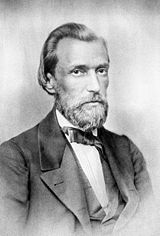
Ivan Savvich Nikitin
Encyclopedia


Born in Voronezh
Voronezh
Voronezh is a city in southwestern Russia, the administrative center of Voronezh Oblast. It is located on both sides of the Voronezh River, away from where it flows into the Don. It is an operating center of the Southeastern Railway , as well as the center of the Don Highway...
into a merchant family, Nikitin was educated in a seminary until 1843. His father's violence and alcoholism brought the family to ruin and forced young Ivan to provide for the household by becoming an innkeeper. After his first publications, he joined a circle of local intelligentsia
Intelligentsia
The intelligentsia is a social class of people engaged in complex, mental and creative labor directed to the development and dissemination of culture, encompassing intellectuals and social groups close to them...
that included his future biographer (and the editor of his collected works) Mikhail De-Lupé. He taught himself French and German and read widely in world literature, and in 1859 he opened a bookstore and library that became an important center of literary and social life in Voronezh.
His first poems appeared in 1849 and his first collection in 1856; his 1858 poem "Kulak" was his most successful with both critics and the public. A second collection came out in 1859, and a prose "Seminarist's Diary" was published in 1861. Some of his poems became the basis for popular songs, set to music by such composers as Vasily Kalinnikov
Vasily Kalinnikov
Vasily Sergeyevich Kalinnikov was a Russian composer of two symphonies, several additional orchestral works and numerous songs, all of them imbued with characteristics of folksong...
, Eduard Nápravník
Eduard Nápravník
Eduard Francevič Nápravník was a Czech conductor and composer, who settled in Russia and is best known for his leading role in Russian musical life as the principal conductor of the Imperial Mariinsky Theatre in Saint Petersburg for many decades...
, and Nikolai Rimsky-Korsakov
Nikolai Rimsky-Korsakov
Nikolai Andreyevich Rimsky-Korsakov was a Russian composer, and a member of the group of composers known as The Five.The Five, also known as The Mighty Handful or The Mighty Coterie, refers to a circle of composers who met in Saint Petersburg, Russia, in the years 1856–1870: Mily Balakirev , César...
. D. S. Mirsky
D. S. Mirsky
D.S. Mirsky is the English pen-name of Dmitry Petrovich Svyatopolk-Mirsky , often known as Prince Mirsky , a Russian political and literary historian who promoted the knowledge and translations of Russian literature in Britain and of English literature in the Soviet Union.-Life:A scion of the...
wrote that his "principal claim to attention" was in "his realistic poems of the life of the poor":
He was inclined sometimes to idealize and sentimentalize them, but his best things are free from this sin. There is an almost epic calm in the long, uneventful, and powerful Night Rest of the Drivers, and an unsweetened realism in such poems of tragic misery as The Tailor. In Kulák, his opus magnum, Nikitin introduced into poetry the methods of realistic prose. He succeeds in evoking pity and terror by the simple account of sordid and trivial misery. But he was not strong enough to create a really new art or a really new attitude to poetry.
Nikita Khrushchev
Nikita Khrushchev
Nikita Sergeyevich Khrushchev led the Soviet Union during part of the Cold War. He served as First Secretary of the Communist Party of the Soviet Union from 1953 to 1964, and as Chairman of the Council of Ministers, or Premier, from 1958 to 1964...
was extremely fond of Nikitin's verse.
External links
- Texts set to music
- Ivan Savvich Nikitin. Poems (in Russian)

